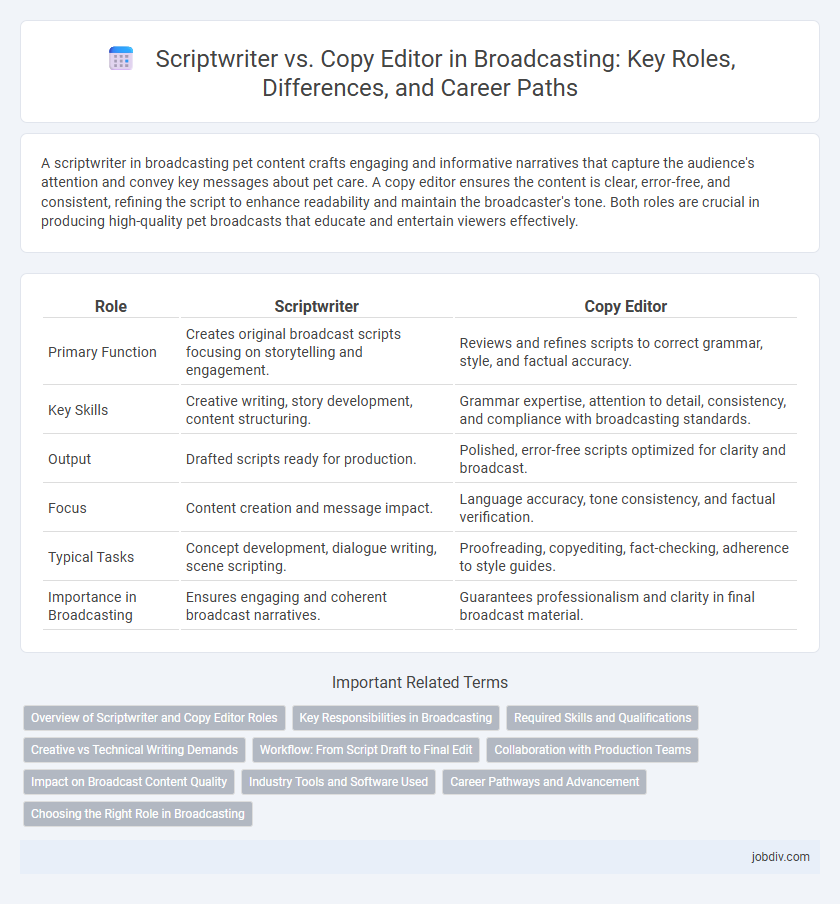A scriptwriter in broadcasting pet content crafts engaging and informative narratives that capture the audience's attention and convey key messages about pet care. A copy editor ensures the content is clear, error-free, and consistent, refining the script to enhance readability and maintain the broadcaster's tone. Both roles are crucial in producing high-quality pet broadcasts that educate and entertain viewers effectively.
Table of Comparison
| Role | Scriptwriter | Copy Editor |
|---|---|---|
| Primary Function | Creates original broadcast scripts focusing on storytelling and engagement. | Reviews and refines scripts to correct grammar, style, and factual accuracy. |
| Key Skills | Creative writing, story development, content structuring. | Grammar expertise, attention to detail, consistency, and compliance with broadcasting standards. |
| Output | Drafted scripts ready for production. | Polished, error-free scripts optimized for clarity and broadcast. |
| Focus | Content creation and message impact. | Language accuracy, tone consistency, and factual verification. |
| Typical Tasks | Concept development, dialogue writing, scene scripting. | Proofreading, copyediting, fact-checking, adherence to style guides. |
| Importance in Broadcasting | Ensures engaging and coherent broadcast narratives. | Guarantees professionalism and clarity in final broadcast material. |
Overview of Scriptwriter and Copy Editor Roles
Scriptwriters develop engaging narratives and dialogue tailored for television, radio, or digital broadcasts, ensuring the content aligns with the production's vision and audience expectations. Copy editors focus on refining scripts by checking grammar, style, coherence, and accuracy to maintain professionalism and clarity in the final broadcast material. Both roles are crucial in producing polished, effective broadcasts but emphasize different stages of the content creation process.
Key Responsibilities in Broadcasting
Scriptwriters in broadcasting craft engaging narratives and dialogue, ensuring content aligns with the show's tone and audience expectations. Copy editors focus on refining scripts by correcting grammar, punctuation, and consistency, enhancing clarity and professionalism. Both roles collaborate to maintain high-quality broadcast content that meets production standards.
Required Skills and Qualifications
Scriptwriters in broadcasting require strong storytelling abilities, creativity, and a solid understanding of narrative structure, along with proficiency in writing scripts for various formats such as television, radio, or digital media. Copy editors must possess exceptional language skills, keen attention to detail, expertise in grammar and style guides, and the ability to ensure content accuracy, consistency, and clarity across all broadcast materials. Both roles demand adaptability to tight deadlines and effective collaboration with production teams to produce polished, audience-engaging content.
Creative vs Technical Writing Demands
Scriptwriters in broadcasting prioritize creative storytelling, crafting engaging dialogue, scenes, and narrative arcs that capture audience attention and evoke emotion. Copy editors focus on technical writing demands by ensuring scripts are clear, concise, and free of errors, adhering to style guides and maintaining consistency. The balance between creative flair and technical precision is crucial for producing polished, broadcast-ready content that resonates with viewers.
Workflow: From Script Draft to Final Edit
Scriptwriters create the initial broadcast script, focusing on narrative structure, dialogue, and pacing tailored to the target audience. Copy editors review the draft for clarity, grammar, style consistency, and adherence to broadcasting standards, ensuring the script is polished and error-free. This workflow ensures a seamless transition from creative content development to precise and professional final editing before production.
Collaboration with Production Teams
Scriptwriters and copy editors play crucial roles in broadcasting by collaborating closely with production teams to ensure content accuracy and audience engagement. Scriptwriters develop creative narratives tailored for visual and audio delivery, while copy editors refine dialogue, correct errors, and maintain consistency across scripts. This collaboration enhances the overall quality and coherence of broadcasts, aligning production objectives with audience expectations.
Impact on Broadcast Content Quality
Scriptwriters shape broadcast content by creating engaging narratives and clear dialogue that maintain audience interest and ensure message clarity. Copy editors enhance content quality by correcting grammar, streamlining flow, and maintaining consistency, which prevents misunderstandings and upholds professional standards. Together, their roles significantly elevate the credibility and effectiveness of broadcast productions.
Industry Tools and Software Used
Scriptwriters in broadcasting often utilize tools like Final Draft and Celtx for structuring dialogue, scenes, and screenplay formatting, ensuring creative clarity and compliance with industry standards. Copy editors rely heavily on software such as Adobe InCopy and Grammarly to refine scripts, correct grammar, and maintain consistency in style and tone. Both roles integrate collaboration platforms like Google Workspace and Slack to streamline communication and document version control within production teams.
Career Pathways and Advancement
Scriptwriters in broadcasting develop original content and storylines, often advancing to lead writer or creative director roles by honing storytelling and industry-specific scripting skills. Copy editors focus on refining scripts for grammar, style, and accuracy, progressing toward senior editor or content manager positions by mastering attention to detail and editorial standards. Both career paths require strong communication and a deep understanding of broadcasting formats, with growth linked to portfolio strength and professional networking.
Choosing the Right Role in Broadcasting
Scriptwriters craft engaging narratives and dialogue that shape the broadcast's storytelling, ensuring content aligns with the target audience and production goals. Copy editors refine scripts by correcting grammar, consistency, and style, enhancing clarity and professionalism before airing. Selecting the right role depends on whether the focus is on creating original content or polishing existing material to maintain broadcast quality.
Scriptwriter vs Copy Editor Infographic

 jobdiv.com
jobdiv.com